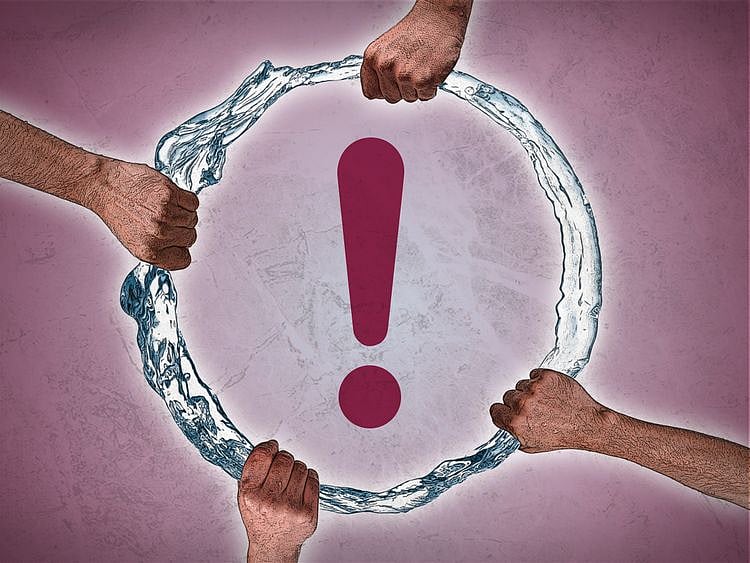Iraq and Syria are being strangled by Turkey; the source of the two great rivers that have sustained civilisations for centuries. The once wet and lush basin of the Euphrates, which is shared by Turkey, Syria and Iraq is drying up at an alarming rate, creating acute water shortages for Syria and even worse for Iraq. Turkey contributes 90 per cent to the Euphrates whilst Syria contributes 10 per cent to the water flow that runs through Iraq, along with the Tigris and flows to the Shatt Al-Arab Basin in Southern Iraq. As for the Tigris, Turkey, Iraq and Iran contribute 40 per cent, 51 per cent and 9 per cent, respectively, according to climate-diplomacy.org.
The main reason behind the drop in the water level to such dangerous levels is Turkey, which has been building dams and controlling the flow of the two rivers. Ankara had sparred with Syria and Iraq over water rights since the 1960s with conflicting results. Launched in 2018, Ilisu dam is one of 22 dams built by Turkey that comprise the Southeastern Anatolia Project and its purpose is to generate hydroelectric power, manage flood control and water storage. The dam, on the Tigris, has reduced the flow of the river into Iraq to the extent that the lives of millions are affected as far south as Iraq’s marshlands.
Water shortages in the region are nothing new but the problem has been compounded by civil wars, terrorism, climate change, human displacement and migration. Geopolitical competition has also contributed to the problem as Turkey seeks to establish itself as a regional power at the expense of others. The Southeastern Anatolia Project, known by its Turkish initials GAP, is also creating tensions between the state and the Kurdish population of the region.
Climate change, which is blamed for poor rainy seasons and drought, has also affected the water level of the Euphrates as it passes through five Iraqi governorates now suffering from water shortages. The Iraqis claim that Turkey is yet to recognise the Euphrates as an international river and blame Ankara for limiting the flow of the Euphrates into Syria, which has its own water shortage problems.
Turkish dam network
The Iraqis say that Turkey has built six dams on the Euphrates, the largest of which is Ataturk Dam, with a storage capacity of 48 billion cubic meters. They say that this is a violation of the international agreement Turkey signed with Syria in 1987. There is no doubt that Turkey is making use of the crisis in Syria, which is battling a civil war, and in Iraq which is emerging from a war with Daesh and is caught between Iran and US influence.
Iraq, which uses more than 80 per cent of its water needs for agriculture, is losing once fertile lands to desertification. As well as a shortage in drinking water the next crisis could affect its food security. Experts believe that since 2019 Iraq’s share of water from the Tigris has dropped by 50 per cent. Drought in the past two years has compounded the problem.
And Iraq’s share of water from the Euphrates has also dropped from 30 billion cubic meters per year to less than 16 billion cubic meters. Turkey responds to accusations by saying that the problems facing Iraq and Syria are due to poor water management. But the Iraqis blame Iran as well for blocking rivers that used to feed the Tigris. Iran is also facing a critical water shortage that has led to public fury and protests.
The water scarcity pattern is being felt, for various reasons by Jordan, the Palestinian Territories and Egypt. The latter is yet to succeed in reaching an agreement on the filling of a major dam in Ethiopia. The scenarios of what this dam could do to the flow of the Nile into Sudan and Egypt are worrying to say the least.
When it comes to water there is no room for compromise. Iraq and major parts of Syria face real existential threats. Unilateral water development projects that affect international rivers are unacceptable. The Egypt-Sudan-Ethiopia case and the failure of the international community to force a solution set a dangerous precedent. But what could eventually happen to Egypt is happening now to Iraq with catastrophic human and environmental outcomes.
Experts predict that the two great rivers could dry up completely by 2040 if nothing happens. The stability of key countries in the region cannot be limited to good governance if millions face thirst and famine as a result of the irresponsible actions of some nations. Lack of action now could trigger water wars in the near future.
Osama Al Sharif is a journalist and political commentator based in Amman.
Sign up for the Daily Briefing
Get the latest news and updates straight to your inbox
Network Links
GN StoreDownload our app
© Al Nisr Publishing LLC 2026. All rights reserved.
